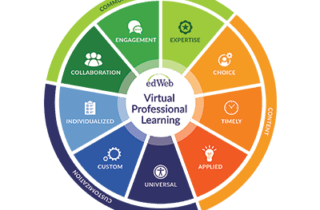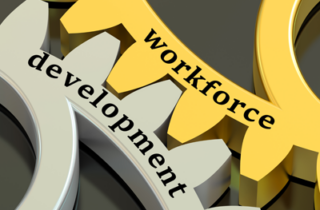There is a big push to minimize screen time for kids because it is often equated to mindless, passive, and static engagement. However, flipping the script (or “flipping the screen”), screen time can be engaging, stimulating, and most importantly, educational.
The U.S. Department of Education recently published a report that suggests women occupy 19% of superintendent positions, but occupy 77% of teaching roles. Given the gap in representation at the highest level, the edLeader Panel “Empowering Women in Leadership: Breaking Barriers and Shaping the Future” brought together three superintendents—Dr. M. Ann Levett, Dr. April Grace, and Dr. Aurelia L. Henriquez—to discuss how to rise to the top as women in education.
edWeb.net is an award-winning professional learning network that helps engaged and innovative educators share their best ideas and practices — anytime, anywhere — with educators around the country and the world. edWeb makes it possible for educators to participate in online professional learning communities that are more open and inclusive, immediate and relevant, engaging and… read more →
If a student’s brain is tuned into defending itself all the time, then how can the student focus on learning? That’s just one question facing educators as they try to create a safe, supportive educational environment for students impacted by trauma.
What does it take for a school district to become an award winner? In the case of Corpus Christi Independent School District (CCISD), it was narrowing the digital access gap, landing it CoSN’s Community Leadership Award for Digital Equity.
Tutoring, it turns out, not only boosts student achievement but also heightens teacher retention, a discovery made by Dr. Tina Powell, Orange Public Schools (NJ) Assistant Superintendent of Innovation and Systems, when her district explored solutions to post-pandemic unfinished learning.
Post-pandemic, districts are looking to eliminate the edtech bloat and determine which products they should keep and which ones to scale back. Of course, educators and administrators could look at past success stories, research data, etc. But what about how the programs are impacting current students?
The end of the school year marks a big transition for students at all levels. Many prepare to make the jump from elementary to middle school, middle to high school, or even between districts. With so many students moving from one place to the next, keeping them on track presents a challenge for district leaders and educators alike.
A common refrain of 21st century education is that teachers are educating students today for jobs that don’t even exist yet. But while schools may not be able to prepare students for an exact occupation, they can give them the skills they need to succeed beyond high school.
With the national teacher shortage crisis looming over districts, retaining teachers has become a pressing issue. In the edLeader Panel, “Build Strong Educational Communities to Increase Teacher Retention,” Dr. Adam Drummond of ICLE and two school principals, Kimberly Vaught and Dr. Lucretia Prince, discussed their strategies for retaining top talent and building successful schools.











